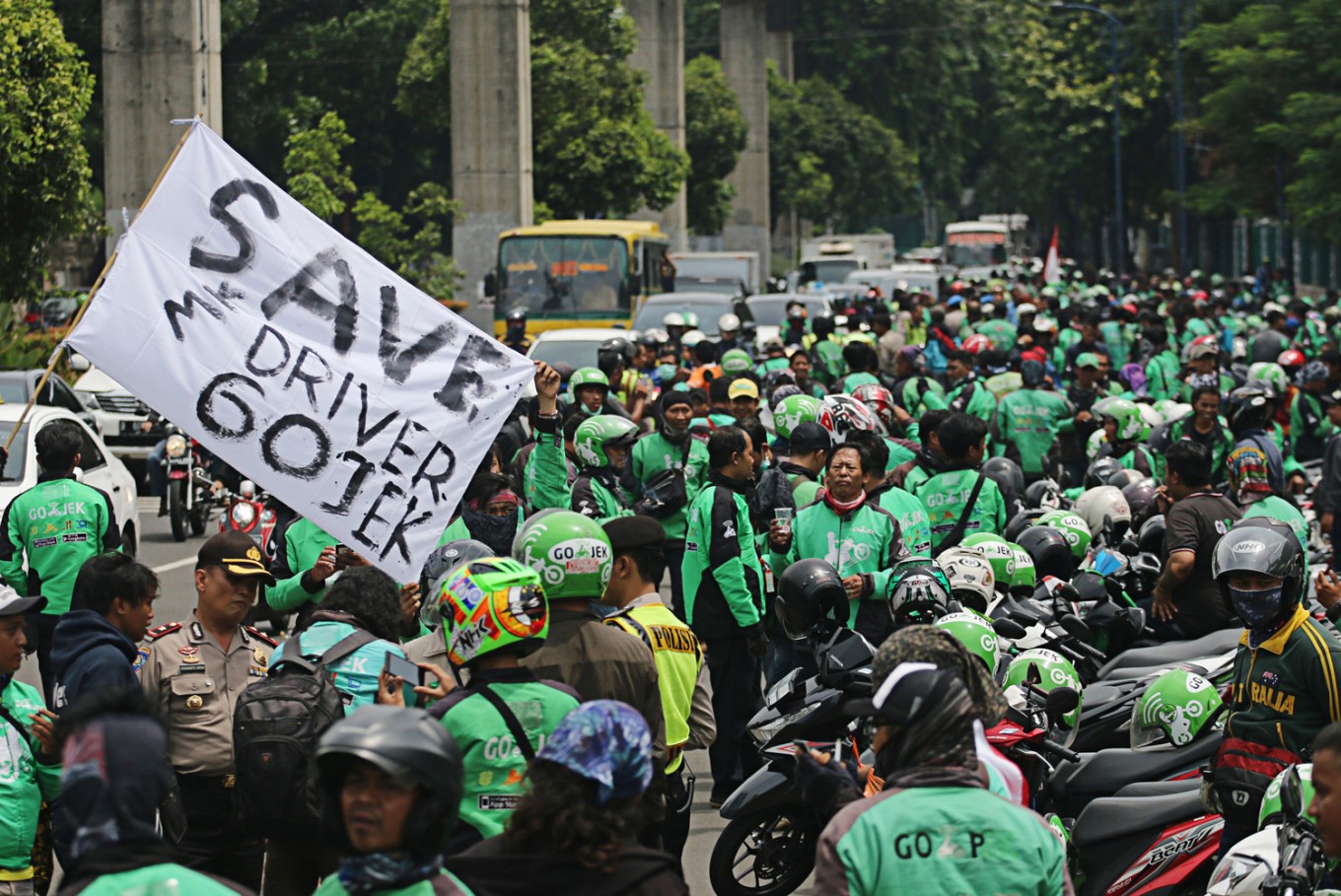Ride-hailing apps to soon see curbs to business
As regional leaders throw their weight behind the new regulation on ride-hailing businesses, the country’s burgeoning ride-hailing industry may soon grapple with significant curbs to its robust development.
Change Size
 Standing for the rights – Hundreds of drivers of smartphone application-based ojek (motorcycle taxi) Gojek stage a peaceful rally to demand a better revenue system in front of the Gojek office on Jl.Asia Afrika, Senayan, Central Jakarta, on Oct.3. (Antara/Reno Esnir)
Standing for the rights – Hundreds of drivers of smartphone application-based ojek (motorcycle taxi) Gojek stage a peaceful rally to demand a better revenue system in front of the Gojek office on Jl.Asia Afrika, Senayan, Central Jakarta, on Oct.3. (Antara/Reno Esnir)
A
s regional leaders throw their weight behind the new regulation on ride-hailing businesses, the country’s burgeoning ride-hailing industry may soon grapple with significant curbs to its robust development.
In a proposed revision to Transportation Ministerial Decree No. 32/2016, set to become effective on April 1, regional administrations will be able to set a minimum and maximum limit to fares to replace the current market mechanism as well as put limits on the number of drivers and fleets partnering with ride-hailing app providers in their respective jurisdictions.
(Read also: More protest app-based transportation)
“We have discussed it and I appreciate that several governors have agreed in principle [with the regulation],” Transportation Minister Budi Karya Sumadi said Tuesday.
Budi made the statement after he and National Police chief Tito Karnavian held a video conference meeting with leaders from Greater Jakarta, West Java, Central Java, East Java, Bali and South Sulawesi. Among the leaders were West Java Governor Ahmad Heryawan, East Java Governor Soekarwo and Surabaya Mayor Tri Rismaharini.
The ministry and the regional administrations see an advantage in enforcing the regulation as it will provide legal certainty for ride-hailing apps and their partners and protect conventional taxi companies from the “overwhelming domination” of ridehailing companies, Budi said. He added that a few regional heads had requested the government’s assistance to determine the service fare limit and fleet quota.
“So we decided that each regional administration will propose the floor and ceiling price and the government will carry out the so-called consultation forum. The fare and quota will be decided by the government based on these suggestions,” Budi said.
As the discussion may take two to three months, the reinforcement of some points in the revised ministerial regulation, including the fares set by regional administrations, fleet quotas and vehicle roadworthy (KIR) tests, will be postponed.
Separately, East Java Police public relations division head Sr. Comr. Barung Mangera confirmed the statement.
“Governor Soekarwo asked the central government, represented by the transportation minister, the communications and information minister and the national police chief, that part of the authority to manage the ride-hailing apps be given to regional governments,” he said.
In the discussion, the governor also asked that the provincial administration be permitted to manage registered and licensed ride-hailing app partners, currently under the supervision of the central government, because it better “understood the character of the respective area”.
(Read also: Transportation Minister rejects request for grace period from ride-sharing app providers)
The Transportation Ministry issued last May a decree that served as a legal basis for the operation of ride-hailing apps amid massive protests from conventional taxi drivers whose incomes have dwindled because of the tighter competition.
However, the ministry later postponed the implementation of the regulation until late October and then delayed again until April 1 due to mounting complaints, including those related to KIR tests and vehicle licensing.
A revision to the latest regulation also includes the quota and fare limits.
Major ride-hailing apps — GoJek, Grab Indonesia and Uber — have strongly opposed some of the proposed points, such as pricing and fleet quotas, which they consider “unrelated to safety”, according to a joint statement released last Friday. When enforced, the pricing and quota restrictions will affect their services to customers.
They also demanded a ninemonth adjustment period before the new rule takes effect, a proposal that the transportation minister rejected.
Budi reiterated that the regulation would take effect on April 1 as planned.
In response to the implementation of the rule, Musa Emyus, the secretary-general of the Jasa Trans Usaha Bersama (JTUB) cooperative, which partners with Uber, said his organization was still discussing its next move.
“We can’t take any action. We are still trying to say that we disagree with the fare limits and the quota,” he said.
Meanwhile, Indonesian Transportation Society (MTI) expert committee head Danang Parikesit said the designation of fare limits was a setback and the government ought to focus on safety issues and the services offered by ride-hailing apps instead.
“The government wants a regulated market but they can’t make a misstep in the decision to manage it,” he said.









